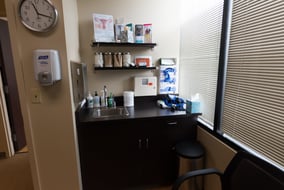Fall is here. It’s time for crisp autumn walks, back-to-school shopping, and —unfortunately — cold and flu season. This fall, prepare for the sniffling, sneezing, and high fevers with a bit of advice from one of Vera’s family nurse practitioners, Kourtney Dunlap. Recently, we sat down with Kourtney to get her top tips and best practices for avoiding the cold and flu this fall.
Q: What’s the best way to prepare for cold and flu season?
Kourtney: Make sure you’re getting your flu shots. Lots of patients are against flu shots because they seem to think the flu shot causes the flu, or that it doesn’t work. But it does. A flu shot is great because it’s going to build up antibodies in your system, so you’re resistant to some parts of the virus. We hope that as the virus progresses, the vaccines we give are still effective. It’s not guaranteed, but it gives you a much better chance. Even a partially effective flu shot will help shorten the length of time that you’re sick. For the people that think they get the flu from having a flu shot, realize that it’s normal to feel slightly achy and tired, or to have a low-grade fever after getting your shot. Know that this is normal and not the actual flu. It is also a possibility that you may have had a cold "coming on" before you received the flu shot.
To prevent any illness, I always encourage my patients to make sure to eat healthy, exercise, and practice good sleep habits. I’d also recommend that they take vitamins/supplements like zinc, vitamin C, and echinacea because those reduce the length of the flu or cold if you do get sick. The biggest thing people can do is practice good hand-washing, especially for patients who travel a lot. And if someone is sick, have them wear a mask and/or avoid contact with other people.
Q: How are cold and flu symptoms different?
Kourtney: If you have the flu, you’ll have a fever of usually over 101 degrees Fahrenheit, consistent with body aches, chills and extreme tiredness. You can also have headaches, cough, sore throat, and/or runny nose; flu can even cause nausea and/or vomiting.
If you have a low-grade fever and have other symptoms such as: a cough, runny nose, congestion, headache, sore throat, or ear pressure, then you most likely have a common cold.
Q: When should someone come into a clinic if they’re feeling sick?
Kourtney: For a cold, you want to come in if it lasts longer than two weeks or more so we can make sure it is not bacterial, or that there isn’t something else going on. As for the flu, we want to see you within the first 48 hours of showing symptoms. If you know you have been around someone with the flu, come in immediately if you have a fever 101 degrees Fahrenheit or higher. And if you’re not sure about what to do, you can always call your Vera clinic and talk to a provider. There’s never any harm in a call, and we can help you decide whether or not to come in.
Q: How do you treat a cold versus a flu differently?
Kourtney: For the flu, we use antiviral medications, if we can treat you within 48 hours of your first symptom(s); but we also always treat your symptoms. We typically recommend over-the-counter pain relievers if you have a fever, pain, or body aches. If you have runny nose with a cold or flu, then we’ll recommend a decongestant or antihistamine. Coughs get cough suppressants. It just depends on your symptoms. Really, the best treatment is lots of rest and staying hydrated. It’s also important to stay out of school and work, and avoid sharing food or drinks with anyone else, until your fever is gone for 24 hours.
Q: How do you know when to avoid others?
Kourtney: For a flu or a cold, you should avoid others as soon as you notice symptoms. For the flu — even after five to seven days — you may still be contagious. A lot depends on the strain. Last year’s flu stuck around a lot longer than normal.
When your fever has been absent for 24 hours you can usually return to school or work. If you’ve taken an antiviral, that will probably take about three to five days. If you haven’t, it will probably be at least five days or more. With a cold, you’re usually getting better by the fifth or sixth day, but I advise my patients to NOT go back to work or school if they are running a fever. If they have been without a fever for 24 hours then, they can return to school or work.
To help avoid getting your co-workers sick, check with your HR team to see if they have specific restrictions or rules regarding returning to work after you've been sick.
Q: What’s the best way to protect others if you have to be in contact with them, like your family?
Kourtney: If you’re coughing, I’d recommend getting a face mask. We always have them available in the office if you need one. Avoid shaking hands with people and be especially careful around those with weaker immune systems, like the elderly or infants. Don’t share food or drinks with sick people. But most important is to wash your hands, wash your hands, wash your hands.
Sign up
Join our email list to receive the latest open positions, Vera Careers news, and more.





